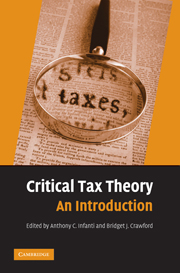Book contents
- Frontmatter
- Contents
- List of Illustrations
- List of Tables
- List of Contributors
- List of Common Abbreviations
- Introduction
- CHAPTER 1 FOUNDATIONS OF CRITICAL TAX THEORY
- CHAPTER 2 HISTORICAL PERSPECTIVES ON TAXATION
- CHAPTER 3 THE GOALS OF TAX POLICY
- CHAPTER 4 CRITICAL TAX THEORY MEETS PRACTICE
- CHAPTER 5 RACE AND TAXATION
- CHAPTER 6 GENDER AND TAXATION
- CHAPTER 7 SEXUAL ORIENTATION AND TAXATION
- CHAPTER 8 THE FAMILY AND TAXATION
- CHAPTER 9 CLASS AND TAXATION
- CHAPTER 10 DISABILITY AND TAXATION
- CHAPTER 11 GLOBAL CRITICAL PERSPECTIVES ON TAXATION
- Toward a Global Critical Feminist Vision: Domestic Work and the Nanny Tax Debate
- The Taxation of Undocumented Immigrants: Separate, Unequal, and Without Representation
- Prying Open the Closet Door: The Defense of Marriage Act and Tax Treaties
- Missing Africa: Should U.S. International Tax Rules Accommodate Investment in Developing Countries?
- Global Trajectories of Tax Reform: The Discourse of Tax Reform in Developing and Transition Countries
- CHAPTER 12 CRITICAL PERSPECTIVES ON CRITICAL TAX THEORY
- Index
Toward a Global Critical Feminist Vision: Domestic Work and the Nanny Tax Debate
Published online by Cambridge University Press: 04 August 2010
- Frontmatter
- Contents
- List of Illustrations
- List of Tables
- List of Contributors
- List of Common Abbreviations
- Introduction
- CHAPTER 1 FOUNDATIONS OF CRITICAL TAX THEORY
- CHAPTER 2 HISTORICAL PERSPECTIVES ON TAXATION
- CHAPTER 3 THE GOALS OF TAX POLICY
- CHAPTER 4 CRITICAL TAX THEORY MEETS PRACTICE
- CHAPTER 5 RACE AND TAXATION
- CHAPTER 6 GENDER AND TAXATION
- CHAPTER 7 SEXUAL ORIENTATION AND TAXATION
- CHAPTER 8 THE FAMILY AND TAXATION
- CHAPTER 9 CLASS AND TAXATION
- CHAPTER 10 DISABILITY AND TAXATION
- CHAPTER 11 GLOBAL CRITICAL PERSPECTIVES ON TAXATION
- Toward a Global Critical Feminist Vision: Domestic Work and the Nanny Tax Debate
- The Taxation of Undocumented Immigrants: Separate, Unequal, and Without Representation
- Prying Open the Closet Door: The Defense of Marriage Act and Tax Treaties
- Missing Africa: Should U.S. International Tax Rules Accommodate Investment in Developing Countries?
- Global Trajectories of Tax Reform: The Discourse of Tax Reform in Developing and Transition Countries
- CHAPTER 12 CRITICAL PERSPECTIVES ON CRITICAL TAX THEORY
- Index
Summary
In December 1992, Zoe Baird became the first woman nominated as Attorney General of the United States. Baird subsequently withdrew her nomination following the disclosure that she failed to pay Social Security taxes for her undocumented live-in child-care worker. Baird, like a majority of working affluent women, knowingly and unlawfully failed to pay Social Security taxes for her domestic employee.
Initially, most senators and political analysts discounted the effect of this disclosure on Baird's nomination, but by January talk radio was calling the controversy Nannygate. Some news commentators framed the issue solely in class terms. The issues raised by Nannygate, however, are much larger, reflecting how work and workers are constructed and valued in American society. Nannygate also raises hard questions long avoided by American feminists about mothering as women's work.
Influenced by Zoe Baird's plight, Congress enacted the Social Security Domestic Employment Reform Act of 1994, popularly known as the Nanny Tax law. The new law increases the threshold amount of employee wages required to trigger the tax from $50 quarterly to $1,000 annually and requires annual instead of quarterly payments of the tax to ease the reporting burden on employers like Baird. Throughout the legislative debate little attention was paid to the real nanny at the heart of the Nannygate controversy, Lillian Cordero, the undocumented Peruvian woman. This essay explores how gender, race, class, and immigrant status influence legal policies affecting paid household workers.
LEGISLATIVE NARRATIVE: FRAMING THE PUBLIC POLICY DEBATE
The narratives of members of Congress and witnesses who participated in the hearings juvenilized, gendered as female, and raced as black in-home or resident child-care workers.
- Type
- Chapter
- Information
- Critical Tax TheoryAn Introduction, pp. 326 - 333Publisher: Cambridge University PressPrint publication year: 2009

